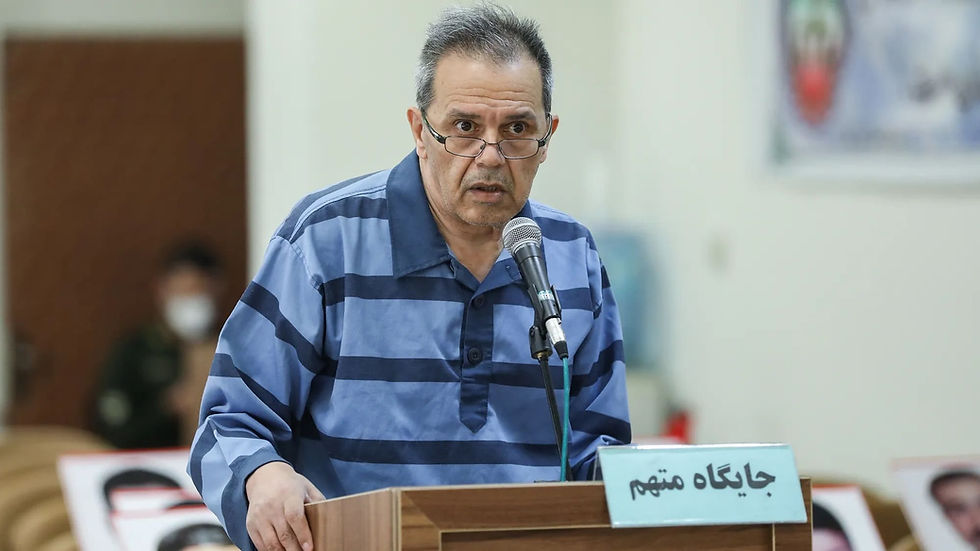Iran's creative resistance: From hugs and kisses to tossing turbans
- lenz094
- 22. Nov. 2022
- 3 Min. Lesezeit
Aktualisiert: 25. März 2023
Iranians vent their rage against the government in creative ways.
Written by Fred Petrossian
It has been eight weeks since protests erupted across Iran on September 16 in response to the death of Mahsa (Zhina) Amini, who was detained by the country's morality police for allegedly violating hijab regulations. Despite harsh repression, the killing of at least 360 people, including 58 children, and the arrest of thousands of protesters, the nationwide movement for freedom has continued.
On Tuesday, November 15, a strike by shopkeepers began across Iran to mark the third anniversary of a brutal crackdown against protesters. Meanwhile, Iranians have used a variety of inventive methods to resist the tyranny that undermines the authority of theocratic rulers.
Iranians defy discriminatory regulations, like the headscarf requirement, as well as government symbols like pro-state banners and cleric turbans. They also oppose the regime whenever they have the chance, even while they are mourning loved ones who were murdered during protests, by chanting anti-government slogans, performing songs, or taking off their headscarves. “Free embracing” is another way they express their love for one another.
No to compulsory hijab
After the Islamic Revolution, Iran’s rulers imposed discriminatory laws on Iranian women, such as the compulsory hijab. Many women, including schoolgirls, have burned their hijabs, cut their hair short, removed their hijabs while walking, and posted about it on social media in protest of Mahsa's murder.
Fighting Iran's gender apartheid
The Islamic Republic imposed gender segregation in many facets of Iranian life. The state has implemented systematic segregation in schools, hospitals, colleges, transportation, and sports. Due to long-standing gender prejudice in Iran, women have been forced to travel in the rear of the bus alongside the men, who were separated from them by a metal bar.
Knocking turbans off clerics’ heads
Iranians have started a “turban throwing” movement to protest Shiite clerics who have been ruling the country. Their authority is being challenged by Iranian youth on the streets.
Dancing, kissing and hugging
Iranian women must adhere to strict dress codes, and public dancing with people of the opposite sex is prohibited. Iranians are defying Islamic law by kissing, hugging, and dancing in public.
Funerals have become venues for anti-regime protests
Iranian use the funerals of murdered protesters to vent their rage at the regime once more.
Protesting Through Art
Artists in Iran and elsewhere have created a wide range of works of art, including music, paintings, cartoons, and animations.
Security forces detained several artists, including rapper Saman Yasin, who was sentenced to death, and famous rapper Toomaj Salehi, who is allegedly being tortured.
Students of the arts are using their talents to criticise the state-sanctioned killing of protesters.
Iranians use art to protest the general situation and to support political prisoners such as Hossein Ronaghi, an outspoken advocate for free expression. On September 24, he was arrested and moved to Evin prison. According to his family, his life is in grave danger because of a kidney condition; he has been on a hunger strike for more than 50 days, and both of his legs have been broken in prison.
Protesting Through Sports
Several athletes have expressed their solidarity with the Iranian people's struggle for freedom. Elnaz Rekabi, an Iranian professional rock climber, was greeted as a hero by the Iranian people after competing in a competition without a hijab, defying the Islamic Republic's rule, in South Korea in October.
On November 16, Saeed Piramoon, a member of the Iranian beach soccer team, symbolically cut his hair after scoring a goal against Brazil to express his solidarity with Iranian women.
People in Iran and around the world remembered and honored Baluch protester Lajaei Khodanoor. Years ago, Khodanoor was reportedly tied to a pole as punishment for getting in a confrontation with the son of a basiji paramilitary member and refused water. He was later killed by Iranian government forces.







Comments